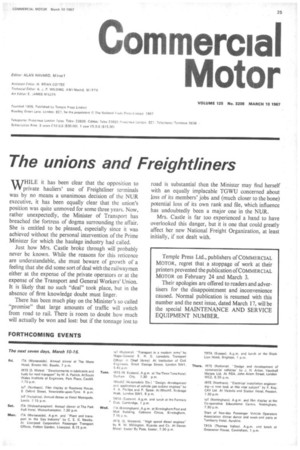The unions and Freightliners
Page 27

If you've noticed an error in this article please click here to report it so we can fix it.
WHILE it has been clear that the opposition to private hauliers' use of Freightliner terminals was by no means a unanimous decision of the NUR executive, it has been equally clear that the union's position was quite unmoved for some three years. Now, rather unexpectedly, the Minister of Transport has breached the fortress of dogma surrounding the affair. She is entitled to be pleased, especially since it was achieved without the personal intervention of the Prime Minister for which the haulage industry had called.
Just how Mrs. Castle broke through will probably never be known. While the reasons for this reticence are understandable, she must beware of growth of a feeling that she did some sort of deal with the railwaymen either at the expense of the private operators or at the expense of the Transport and General Workers' Union. It is likely that no such "deal" took place, but in the absence of firm knowledge doubt must linger.
There has been much play on the Minister's so-called "promise" that large amounts of traffic will switch from road to rail. There is room to doubt how much will actually be won and lost: but if the tonnage lost to road is substantial then the Minister may find herself with an equally implacable TGWU concerned about loss of its members' jobs and (much closer to the bone) potential loss of its own rank and file, which influence has undoubtedly been a major one in the NUR.
Mrs. Castle is far too experienced a band to have overlooked this danger, but it is one that could greatly affect her new National Freight Organization, at least initially, if not dealt with.




































































































































